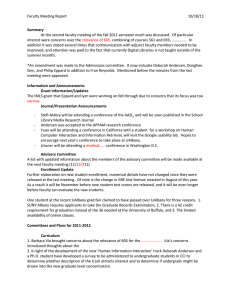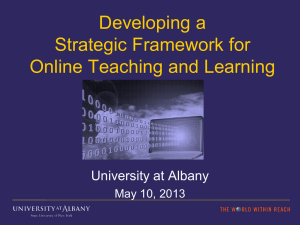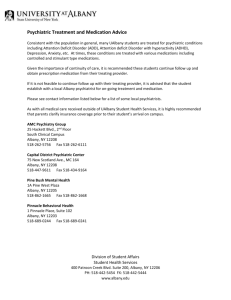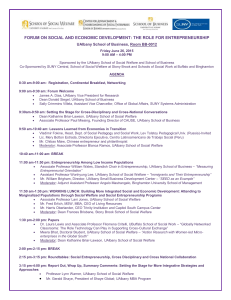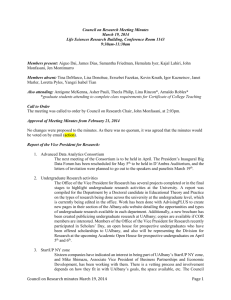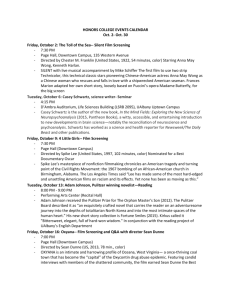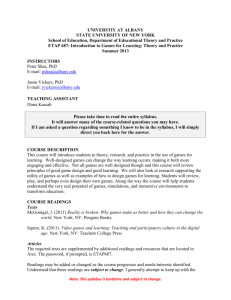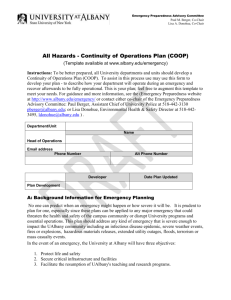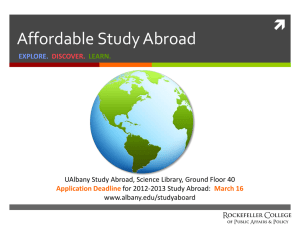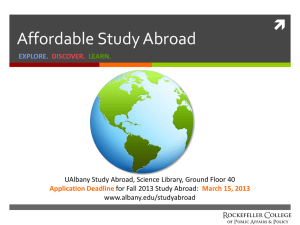Click here for descriptions
advertisement
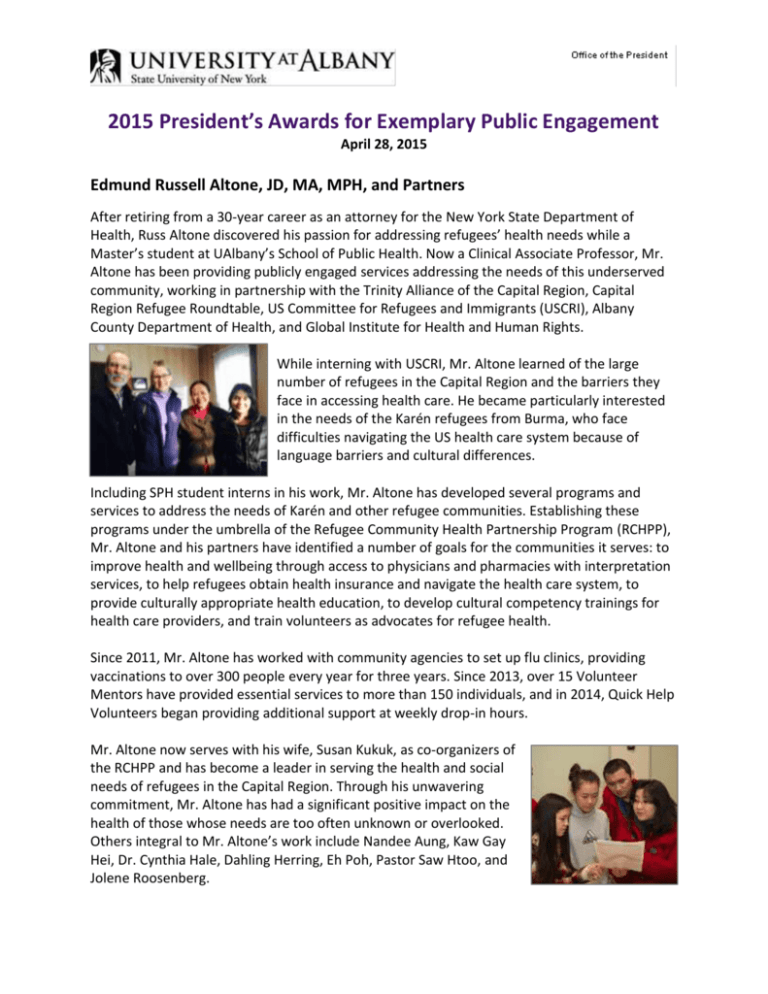
2015 President’s Awards for Exemplary Public Engagement April 28, 2015 Edmund Russell Altone, JD, MA, MPH, and Partners After retiring from a 30-year career as an attorney for the New York State Department of Health, Russ Altone discovered his passion for addressing refugees’ health needs while a Master’s student at UAlbany’s School of Public Health. Now a Clinical Associate Professor, Mr. Altone has been providing publicly engaged services addressing the needs of this underserved community, working in partnership with the Trinity Alliance of the Capital Region, Capital Region Refugee Roundtable, US Committee for Refugees and Immigrants (USCRI), Albany County Department of Health, and Global Institute for Health and Human Rights. While interning with USCRI, Mr. Altone learned of the large number of refugees in the Capital Region and the barriers they face in accessing health care. He became particularly interested in the needs of the Karén refugees from Burma, who face difficulties navigating the US health care system because of language barriers and cultural differences. Including SPH student interns in his work, Mr. Altone has developed several programs and services to address the needs of Karén and other refugee communities. Establishing these programs under the umbrella of the Refugee Community Health Partnership Program (RCHPP), Mr. Altone and his partners have identified a number of goals for the communities it serves: to improve health and wellbeing through access to physicians and pharmacies with interpretation services, to help refugees obtain health insurance and navigate the health care system, to provide culturally appropriate health education, to develop cultural competency trainings for health care providers, and train volunteers as advocates for refugee health. Since 2011, Mr. Altone has worked with community agencies to set up flu clinics, providing vaccinations to over 300 people every year for three years. Since 2013, over 15 Volunteer Mentors have provided essential services to more than 150 individuals, and in 2014, Quick Help Volunteers began providing additional support at weekly drop-in hours. Mr. Altone now serves with his wife, Susan Kukuk, as co-organizers of the RCHPP and has become a leader in serving the health and social needs of refugees in the Capital Region. Through his unwavering commitment, Mr. Altone has had a significant positive impact on the health of those whose needs are too often unknown or overlooked. Others integral to Mr. Altone’s work include Nandee Aung, Kaw Gay Hei, Dr. Cynthia Hale, Dahling Herring, Eh Poh, Pastor Saw Htoo, and Jolene Roosenberg. Center for Human Services Research for its partnership with Healthy Families New York The School of Social Welfare’s Center for Human Services Research (CHSR) has been partnering with Healthy Families New York since the program was implemented in 1995 by the New York State Office of Child and Family Services (OCFS). CHSR has worked to provide publicly engaged research, quality data support, and evaluation services to improve the design and delivery of the Healthy Families (HFNY) program so it can better serve expectant and new parents across New York State. HFNY is an evidence-based practice providing home visitation services to prevent child maltreatment, promote child and family health and safety, educate parents about child development and effective parenting practices, and increase school readiness. The program serves 36 communities in New York, reaching some of the state’s most vulnerable families. A large study of the program conducted by CHSR and HFNY and involving over 1,200 families has shown the positive outcomes of the program. This research has helped demonstrate the program model’s effectiveness, leading to federal recognition and its eligibility for funding under the Affordable Care Act. The model is implemented across the country in over 600 communities and received a “proven practice” designation by the RAND Corporation and others. The research by CHSR is a continuing effort, and includes one of the first longitudinal randomized controlled studies of its kind showing the long-term impacts of the Healthy Families model and the importance of early interventions on child development. As OCFS Healthy Families NY Coordinator Bernadette Johnson says, “much of the program success can be attributed to the work of the Center.” Additional services provided by CHSR include the development of a web-based database system used by all Healthy Families New York sites collecting information on demographics, medical events, pregnancy outcomes, family issues, and other factors. Ongoing technical assistance and training provided by CHSR and partners at OCFS and Prevent Child Abuse New York to a wide range of program staff and field workers ensure continuous program quality improvement. The efforts of CHSR researchers Rose Greene, John Heck, and Eunju Lee, in partnership with Healthy Families New York, have shown it to be an evidence-based practice and helped build similar programs nationally. This deep partnership has resulted in trust and credibility with community partners and service providers across the state and positive outcomes for children and families. 2 Center for Technology in Government for its work on the National Youth in Transition Database Peer Caller Program Since 2010, the Center for Technology in Government (CTG) has been working with the New York State Office of Child and Family Services (OCFS) to help implement the National Youth in Transition Database (NYTD) to track foster care youth as they age out of the system and transition to independent living. This sustained publicly engaged research and service and the new Peer Caller Program helps give youth a voice in improving the services they receive. Under the direction of OCFS Assistant Commissioner Lisa Ghartey Ogundimu, the NYTD data collection effort engages over 1,600 youth annually. The project needed a more effective way to build sustainable and trusting relationships with youth and get their direct input on the independent living services provided by New York State. In response, UAlbany student and OCFS intern Raven Profit and CTG staff members Hillary Dolinsky, Brian Burke, and Natalie Helbig developed a peer-to-peer caller program to address this need. The Peer Caller Program trains participating youth, including UAlbany students, OCFS interns, and current and former youth in foster care, in how to keep youth engaged in the NYTD program through consistent outreach and relationship building. Peer callers learn about cultural awareness, crisis management, confidentiality, and communication to prepare them for making phone calls to NYTD eligible youth. The consistent engagement has not only improved data collection, but it also provides a point of communication for youth who have left foster care. Peer callers interact with youth every three to six months to stay in touch, build a trusting relationship, and emphasize to these youth that their voice can make a difference in the future of independent living services. CTG has seen positive results from the program, witnessing an increase in the number of youth who stay in touch with NYTD. This past summer, peer callers made more than 150 connections, providing a unique opportunity to inform foster care policy and practice with direct feedback from those receiving services. By engaging current foster care youth, NYTD has become more efficient, effective, and sustainable. This program is pioneering NYTD outreach efforts across the country and was featured this year as a best practice in the National Governor’s Association newsletter. CTG, Ms. Profit, and participating UAlbany peer callers are making a difference in the lives of foster care youth, helping to improve the system by building relationships between government programs and the people they serve. 3 Emerging Issues in the Nonprofit Sector Program and Partners Since 2012, representatives from Rockefeller College and the Schools of Public Health and Social Welfare have been collaborating on an innovative workshop series designed to increase the capacity, sustainability, and service delivery of the Capital Region’s nonprofit community. Incorporating publicly engaged research, teaching, and service, the program is a major step toward institutionalizing a university-nonprofit partnership and support network. New York’s nonprofit sector is the largest of any state in the U.S. by total revenue and employs over 20% of the state’s workforce. However, changes in public needs, funding structures, government regulations, and other factors are shifting how nonprofits operate. In response to these changes in the sector, the Emerging Issues Steering Committee launched a survey asking local nonprofit leaders about their areas of need. Responses identified the need for the resulting workshop series. Emerging Issues hosts four events each year and over 600 participants from over 400 nonprofit organizations have participated since the program’s launch in 2013. Topics have included mergers and collaborations, board governance, performance measurement, and fundraising, among others. Each workshop features a nationally or internationally recognized expert, UAlbany expert, and/or local nonprofit leaders, as well as roundtable discussions on specific concepts related to the workshop topic. Participants have the opportunity to network with other leaders in the community as well as UAlbany faculty and students to share expertise and experiences. An advisory council made up of local nonprofit leaders from 30 organizations is providing strategic assistance and guidance as the program has developed. In addition, workshop organizers have worked in partnership with the United Way of the Greater Capital Region, Albany-Colonie Chamber of Commerce, Chamber of Schenectady County, and Rensselaer County Chamber of Commerce to collaborate on workshop topics, invite speakers, and assist with funding. Though the initiative is relatively new, program evaluations show its importance to local organizations. Additionally, the stronger relationship between the University and the nonprofit sector has opened the door for research partnerships and learning opportunities, including an ongoing partnership with AVillage on strategic planning and financial analysis. The Steering Committee has also presented a paper at a national conference detailing their innovative model of engagement and the role universities can have in the nonprofit sector. Steering Committee members include Yvonne Harrison (RC), Peter Finn (RC), Stephanie Wacholder (SSW), Janine Jurkowski (SPH), Patricia McGeown (SPH), Mary Applegate (SPH), Deb Oriola (SPH), Estella Williamson (SSW), and Michael Breslin (RC/SSW). 4 Five Quad Volunteer Ambulance Service, Inc. and Partners The Five Quad Volunteer Ambulance Service provides exemplary publicly engaged service in the form of emergency medical assistance to the UAlbany campus and surrounding communities. Founded 42 years ago, Five Quad is completely staffed by UAlbany student volunteers trained in emergency medical response and patient care, operating 24/7 during the academic year. Five Quad can be found at most major campus events as emergency medical service (EMS) standby support, and always has one of its two ambulances staffed and ready to respond to emergencies. In addition to staffing events and responding to on-campus calls, Five Quad serves communities within a five-mile radius from the UAlbany campus, working in partnership with Colonie and Guilderland EMS, Albany Fire Department, Mohawk Ambulance Service, and Western Turnpike Rescue Squad. They are unique as an ambulance service as the only one in the Capital Region that does not charge for its services. The organization’s student volunteers, many of whom go on to medical school and other health fields after graduation, also lead CPR classes on and off campus, provide education on drug and alcohol related emergencies, organize food and clothing drives, and visit local schools to teach students about what to do during medical emergencies. They recently trained over 500 Guilderland residents in Hands Only CPR. Their partnership with the Regional Emergency Medical Organization has led to an EMT class held on campus, for which students can receive course credit. One community partner stated that they were continually impressed with Five Quad, which regularly sets their standards higher than traditional EMT classes. Their service to the community has been described by partners as “invaluable,” “quick and professional,” and “trusted unconditionally.” Their recognized skill as first responders is not limited to medical assistance, but also providing emotional support to patients and families. In addition to this UAlbany award, Five Quad was recognized by the National Collegiate Emergency Foundation. Beating out 141 other college EMS programs across the country, Five Quad was named the 2015 Emergency Medical Services Organization of the Year. UAlbany Senior Nicholas Maenza is currently the President of Five Quad, a program under the Division of Student Success. A full list of Five Quad members can be found at: http://www.fivequad.org/contact-us. 5 Know Your Schools~for NY Kids and Partners Since 2004, Kristen Wilcox, Janet Angelis, and Sharon Wiles have spearheaded an exemplary publicly engaged research agenda through the School of Education, using empirical data to improve K-12 schools across New York State. By identifying and sharing stories of schools that are “beating the odds,” their efforts are bridging the gap between education research and practice and improving educational outcomes for students. Know Your Schools~for NY Kids supports K-12 schools in three main ways. For over ten years, the “NYKids” researchers have visited exemplary schools to derive school improvement models and strategies, resulting in case studies and materials for education leaders working to develop improvement plans at their own schools. Their COMPASS workshops, offered in conjunction with the Capital Area School Development Association, bring research findings to school leadership teams and provide opportunities for them to identify needs and set priorities for improvement. Additionally, NYKids research has led to collaborations with the New York State Education Department as New York’s Race to the Top agenda has been implemented throughout the state. Know Your Schools~for NY Kids has yielded a wide array of products and tools for both practitioners and researchers. Wilcox, Angelis, and Wiles and their research partners have produced case studies, cross-case reports, op-ed pieces, and interactive data displays, as well as made presentations at regional, state, national and international conferences. This decade-long research-to-practice project uses the state’s high stakes test data to identify higher-performing schools to in turn determine effective high-impact practices, especially for high needs student populations. It has a particular focus on schools with high rates of poverty, at-risk youth, and ethnic/linguistic minorities. Since the project’s inception, NYKids researchers have studied over 84 schools across New York and provided each with a case study to inform their own work as well as the work of educators in other settings. In addition, the leadership teams of more than 36 schools have benefitted from the COMPASS workshops. One example of the impact of this research comes from Amsterdam High School, where a higher graduation rate and smaller achievement gaps have been attributed the NYKids’ resources and related COMPASS processes and tools. With a wide array of partners including the New York State School Boards Association, New York State United Teachers, New York State Council of School Superintendents, and Capital Region BOCES, among others, the NYKids researchers are bringing together scholarly inquiry, private interest, and public governance to improve schools and outcomes for New York’s students. 6 Looking at Lemon: Transforming Life through Literature Program and Partners This past year, the New York State Writers Institute (NYSWI), Performing Arts Center (PAC), University Art Museum (UAM), and University at Albany Foundation (UAF) collaborated to develop a series of events focused on the life and work of Tony-award winning poet Lemon Andersen. Exemplifying publicly engaged teaching and service, these UAlbany entities worked in partnership with Albany High School (AHS) and Albany Fund for Education (AFE) to develop an interactive, interdisciplinary program for Albany High School students and the general public around the transformative potential of the arts. Lemon Andersen’s story is inspiring, as a high school drop-out and three-time felon turned poet, actor, and performance artist. He credits attending his first poetry reading with giving him a sense of purpose in life. Recognizing that his message would resonate with at-risk youth, UAlbany and AHS partnered to plan and host a series of events for students to explore Andersen’s work and social issues surrounding race, class, poverty, drugs, and the criminal justice system. In addition to the public events at UAlbany that incorporated three different artistic genres – film, theater, and literature – the program at AHS included in-class discussions, homework assignments, a visit to see Andersen’s play at UAlbany, pre- and post-performance sessions, and small group workshops with Lemon Andersen himself. A total of 175 students participated, all of whom received a free copy of Andersen’s memoir, County of Kings. The program stressed writing as a means of expressing and sharing emotions not easily communicated and Andersen encouraged all students to write, stating “everyone struggles and everyone has a story.” During the post-performance workshop, students had the opportunity to prepare and read their own original poems related to Andersen’s message of overcoming obstacles. Students described the experience as “inspiring,” “liberating,” “motivating,” and “cathartic.” Thanks to the UAlbany Foundation, every student attending Lemon’s play (400 area high school students in total) received a copy of his book. This partnership built on PAC’s longstanding involvement with AHS’s theater program, and on the National Endowment for the Arts’ “Big Read,” involving UAlbany, AHS, and the Albany Public Library. The success of Looking at Lemon has sparked conversations about future opportunities for collaboration. UAlbany partners include: Donald Faulkner and Suzanne Lance (NYSWI); Patrick Ferlo and Kim Engel (PAC); Janet Riker and Naomi Lewis (UAM); and Fardin Sanai (UAF). Community partners include: Alicia Abdul, Mercedes Austin, Amie Chermack, Ward Dales, Christina von Fricken (AHS); and Onnolee Smith (AFE). 7 Program Gambling Research and Treatment Group for its work with Albany Center for Problem Gambling/Capital Counseling The Problem Gambling Research and Treatment Group (PGRTG), under the leadership of Dr. Edelgard Wulfert, Dean of UAlbany’s College of Arts & Sciences and Professor of Psychology, began collaborating with the Albany Center for Problem Gambling in 2002 to develop an innovative model to treat individuals with severe gambling issues. Exemplifying publicly engaged research, teaching, and service, the partnership has resulted in the development of a promising alternative treatment titled “Cognitive-Motivational Behavior Therapy” (CMBT). Between 6 and 8 million Americans have a serious gambling problem, causing many negative consequences for individuals, families, and society. With all but 2 states offering or expanding legal gambling opportunities, gambling addiction is a growing concern. Licensed counselors using the CMBT treatment model work with gamblers, focusing on motivational enhancement to engage them in the treatment process, developing necessary cognitive and behavioral skills to resist gambling, and promoting lifestyle changes to prevent relapse. Over the past 12 years, the PGRT Group has conducted three separate clinical trials with over 100 gamblers. The close collaboration between treatment personnel and researchers has led to modifications and improvements in the CMBT model. The partnership is also engaged in training counselors, thus creating an ongoing dialogue between researchers and practitioners. Currently, CMBT methods are being used by counselors affiliated with the Albany VA and the Queens Gambling Treatment Center for Excellence and is being tested or implemented in gambling treatment centers throughout New York State and Canada. The PGRT Group also engages undergraduate and graduate students in research on addictive behaviors. Dr. Wulfert provides students with invaluable opportunities to develop related research projects, generate new hypotheses, present scientific findings at local and national meetings, and teach workshops for therapists and counselors. In addition, doctoral students conduct treatment with clients, perform clinical evaluations, and participate in supervision and support activities. Many of these doctoral students go on to academic careers in related fields. Based on her research and expertise, Dr. Wulfert is a recognized leader in the field. For six years, she has served as Director on the Board of the New York Council for Problem Gambling, where she also chairs the Council’s Research Committee. In 2014, she provided expert testimony to the New York State Gaming Commission. Her partnership with Capital Counseling’s Center for Problem Gambling and other clinical sites is helping to improve the lives of many individuals and families afflicted by gambling-related issues. 8 Derik Smith for his work with the Bard Prison Initiative Soon after his appointment as an Assistant Professor in the English Department at UAlbany, Dr. Derik Smith began sharing his expertise in African American literature with community audiences. His partnership with the Bard Prison Initiative (BPI) and work with communities and organizations in Albany has resulted in exemplary publicly engaged research and service. The Bard Prison Initiative, founded in 1999, enrolls 300 inmates each year across 6 prisons, offering graduates the same diploma as their counterparts at Bard College. The program has been shown to reduce recidivism and increase economic and employment opportunities for inmates after their release. Nearly 60 student-inmates have taken Dr. Smith’s courses since 2013, with some of them requesting he teach additional courses. Megan Callaghan, BPI’s Director of College Operations, states that in the three years he has been involved, Dr. Smith has shown “demonstrated commitment to his students and support for their pursuit of academic achievement.” However, Dr. Smith’s goal in teaching student-inmates focuses more on developing an intellectual community as well as providing a renewed sense of identity and self-worth. He believes that the community created and the ability to write and discuss concepts in the prison classroom can help student-inmates contribute to grassroots social change in their home communities upon release. As a result of his efforts, Dr. Smith has presented a conference paper describing his pedagogical model of working with his students to collaboratively create a prison classroom community, with future publications in the works. In addition to his work with the Bard Prison Initiative and his student-inmates, Dr. Smith shares his scholarship and knowledge of African American literature with community groups around the Albany area. Working with the Albany Public Library, the African American Cultural Center of the Capital Region, and other partners, Dr. Smith has guided community groups in conversations about many elements of African American culture and art. Working with middle and high school students in the Liberty Partnership Program, Dr. Smith has facilitated discussion on a variety of topics using music as a way to reach the students. Whether working with student-inmates through BPI or with community groups around Albany, Dr. Smith’s engaging and inclusive teaching style and passion for art, culture and social justice is working to build community and hope where it is most needed. 9
